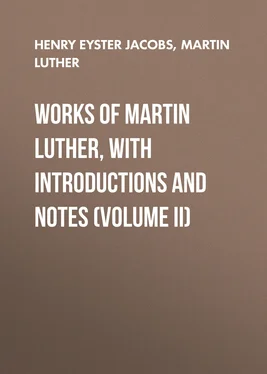Henry Eyster Jacobs - Works of Martin Luther, with Introductions and Notes (Volume II)
Здесь есть возможность читать онлайн «Henry Eyster Jacobs - Works of Martin Luther, with Introductions and Notes (Volume II)» — ознакомительный отрывок электронной книги совершенно бесплатно, а после прочтения отрывка купить полную версию. В некоторых случаях можно слушать аудио, скачать через торрент в формате fb2 и присутствует краткое содержание. Жанр: foreign_prose, foreign_religion, Философия, foreign_psychology, foreign_antique, на немецком языке. Описание произведения, (предисловие) а так же отзывы посетителей доступны на портале библиотеки ЛибКат.
- Название:Works of Martin Luther, with Introductions and Notes (Volume II)
- Автор:
- Жанр:
- Год:неизвестен
- ISBN:нет данных
- Рейтинг книги:3 / 5. Голосов: 1
-
Избранное:Добавить в избранное
- Отзывы:
-
Ваша оценка:
- 60
- 1
- 2
- 3
- 4
- 5
Works of Martin Luther, with Introductions and Notes (Volume II): краткое содержание, описание и аннотация
Предлагаем к чтению аннотацию, описание, краткое содержание или предисловие (зависит от того, что написал сам автор книги «Works of Martin Luther, with Introductions and Notes (Volume II)»). Если вы не нашли необходимую информацию о книге — напишите в комментариях, мы постараемся отыскать её.
Works of Martin Luther, with Introductions and Notes (Volume II) — читать онлайн ознакомительный отрывок
Ниже представлен текст книги, разбитый по страницам. Система сохранения места последней прочитанной страницы, позволяет с удобством читать онлайн бесплатно книгу «Works of Martin Luther, with Introductions and Notes (Volume II)», без необходимости каждый раз заново искать на чём Вы остановились. Поставьте закладку, и сможете в любой момент перейти на страницу, на которой закончили чтение.
Интервал:
Закладка:
[Sidenote: Exclusion of Temporal Matters from the Papal Court]
4. It should be decreed that no temporal matter shall be taken to Rome 217 217 i. e., Appealed to Rome for decision. This is the subject of the first of the 102 Gravamina of 1521 (Wrede, op. cit. , II, 672).
, but that all such cases shall be left to the temporal authorities, as the Romans themselves decree in that canon law of theirs, which they do not keep. For it should be the duty of the pope, as the man most learned in Papal the Scriptures and most Holy, not in name only, but in truth, to administer affairs which concern the faith and holy life of Christians, to hold the primates and archbishops to these things, and to help them in dealing with and caring for these matters. So St. Paul teaches in I Corinthians vi, and takes the Corinthians severely to task or their concern with worldly things [1 Cor. 6:7]. For it works intolerable injury to all lands that such cases are tried at Rome. It increases the costs, and moreover the judges do not know the manners, laws and customs of the various countries, so that they often do violence to the acts and base their decisions on their own laws and opinions, and thus injustice is inevitably done the contestants.
[Sidenote: and from the Bishops' Courts]
Moreover, the outrageous extortion practised by the officiales 218 218 The judges in the bishops' courts. The complaint is that they interfere with the administration of justice by citing into their courts cases which properly belong in the lay courts, and enforce their verdicts (usually fines) by means of ecclesiastical censures. The charges against these courts are specified in the Gravamina of 1521, Nos. 73-100 (Wrede, op. cit. , II, 694-703).
must be forbidden in all the dioceses, courts so that they may attend to nothing else than matters of faith and good morals, and leave to the temporal judges the things that concern money, property, life and honor. The temporal authorities, therefore, should not permit sentences of ban or exile when faith or right life is not concerned. Spiritual authorities should have rule over spiritual goods, as reason teaches; but spiritual goods are not money, nor anything pertaining to the body, but they are faith and good works.
[Sidenote: A German Church Organization]
Nevertheless it might be granted that cases which concern benefices or livings should be tried before bishops, archbishops and primates. Therefore, in order to decide contests and contentions, it might be possible for the Primate of Germany to maintain a general consistory, with auditors and chancellors, which should have control over the signaturae gratiae and signaturae justitiae 219 219 The signatura gratiae and the signatura justitiae were the bureaus through which the pope regulated those matters of administration which belonged to his own special prerogative.
, that are now controlled at Rome, and which should be the final court of appeal for German cases. The officers of this consistory must not, however, be paid, as at Rome, by chance presents and gifts, and thereby acquire the habit of selling justice and injustice, which they now have to do at Rome because the pope gives them no remuneration, but allows them to fatten themselves on presents. For at Rome no one cares what is right or not right, but only what is money or not money. This court might, however, be paid out of the annates, or some other way might easily be devised, by those who are more intelligent and who have more experience in these matters than I. All I wish to do is to arouse and set to thinking those who have the ability and the inclination to help the German nation become once more free and Christian, after the wretched, heathenish and unchristian rule of the pope.
[Sidenote: Abolition of Reservations]
5 . No more reservations should be valid, and no more benefices should be seized by Rome, even if the incumbent dies, or there is a contest, or the incumbent is a "servant" of a cardinal or of the pope 220 220 See above, pp. 88 f.
; and it should be strictly forbidden and prevented that any "courtesan" 221 221 See above, p. 88, note 3.
should institute a contest over any benefice, so as to cite pious priests to Rome, harass them and drive them into lawsuits. If, in consequence of this prohibition, there should come from Rome a ban or an ecclesiastical censure, it should be disregarded, just as though a thief were to lay a man under the ban because he would not let him steal. Indeed they should be severely punished because they so blasphemously misuse the ban and the name of God to support their robbery, and with falsely devised threats would drive us to endure and to praise such blasphemy of God's name and such abuse of Christian authority, and thus to become, in the sight of God, partakers in their rascality; it is our duty before God to resist it, or St. Paul, in Romans i, reproves as guilty of death not only "those who do such things," but also those who consent to such things and allow them to be done [Rom. 1:32]. Most unbearable of all is the lying reservatio pectoralis 222 222 See above, p. 94.
, whereby Christendom is so scandalously and openly put to shame and scorn, because its head deals in open lies, and out of love for the accursed money, shamelessly deceives and fools everybody.
[Sidenote: Abolition of Reserved Cases]
6 . The casus reservati 223 223 i. e., The cases in which a priest was forbidden to give absolution. The reference here is to cases in which only the pope could absolve. Cf. The XCV Theses , Vol. I, p. 30.
, the "reserved cases," should also be abolished, for not only are they the means of served extorting much money from the people, but by means of them the ravening tyrants ensnare and confuse many poor consciences, to the intolerable injury of their faith in God. This is especially true of the ridiculous and childish cases about which they make so much ado in the Bull Coena Domini 224 224 A papal bull published annually at Rome on Holy Thursday. It was directed against heretics, but to the condemnation of the heretics and their heresies was added a list of offences which could receive absolution only from the pope, or by his authorisation. In 1522 Luther translated this bull into German as a New Year present for the pope ( Weimar Ed. , VIII, 691). On Luther's earlier utterances concerning it, see Kohler, L. u. die Kg. , pp. 59 2.
, and which are not worth calling daily sins, still less cases so grave that the pope may not remit them by any indulgence; as for example, hindering a pilgrim on his way to Rome, furnishing weapons to the Turks, or tampering with papal letters. With such gross, crazy, clumsy things do they make fools of us! Sodom and Gomorrah, and all the sins which are committed and can be committed against the commandments of God are not reserved cases; but sins against what God has never commanded and what they have themselves devised, these must be reserved cases, solely that no one be hindered in bringing money to Rome, in order that, safe from the Turks, they may live in luxury and keep the world under their tyranny with their wanton, useless bulls and breves 225 225 The breve is a papal decree, of equal authority with the bull, but differing from it in form, and usually dealing with matters of smaller importance.
.
All priests ought rightly to know, or else there should be a public ordinance to that effect, that no secret sin, of which a man has not been publicly accused, is a reserved case, and that every priest has the power to remit all sorts of sins, however they may be called, so long as they are secret; moreover that no abbot, bishop or pope has the power to reserve any such case to himself 226 226 Cf. Luther's earlier statement to the same effect in A Discussion of Confession , Vol. I, pp. 96 f.
. If they attempt it, their reservation does not hold and is not valid, and they should be reproved, as men who without authority interfere in God's judgment, and without cause ensnare and burden poor, ignorant consciences. But if great public sins are committed, especially sins against God's commandments, then there is indeed a reason for reserved cases, but even then there should not be too many of them, and they should not be reserved arbitrarily and without cause; for Christ has set in His Church not tyrants, but shepherds, as saith St. Peter [1 Pet. 5:3].
Интервал:
Закладка:
Похожие книги на «Works of Martin Luther, with Introductions and Notes (Volume II)»
Представляем Вашему вниманию похожие книги на «Works of Martin Luther, with Introductions and Notes (Volume II)» списком для выбора. Мы отобрали схожую по названию и смыслу литературу в надежде предоставить читателям больше вариантов отыскать новые, интересные, ещё непрочитанные произведения.
Обсуждение, отзывы о книге «Works of Martin Luther, with Introductions and Notes (Volume II)» и просто собственные мнения читателей. Оставьте ваши комментарии, напишите, что Вы думаете о произведении, его смысле или главных героях. Укажите что конкретно понравилось, а что нет, и почему Вы так считаете.












